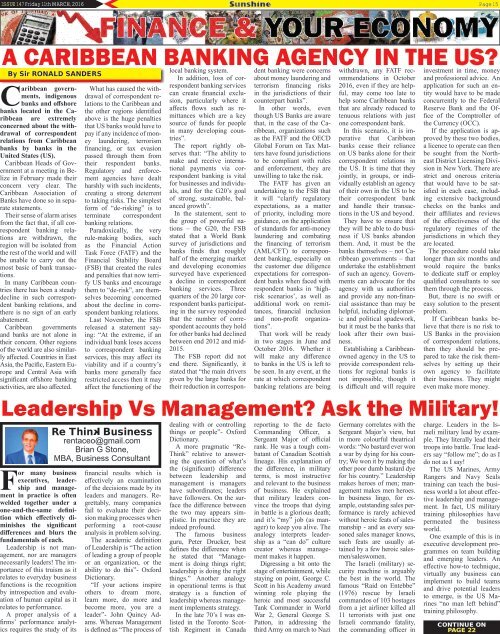RENTAL DEAL!
13oBuOATS
13oBuOATS
Create successful ePaper yourself
Turn your PDF publications into a flip-book with our unique Google optimized e-Paper software.
ISSUE 147 Friday 11th MARCH, 2016<br />
Page 15<br />
A CARIBBEAN BANKING AGENCY IN THE US?<br />
By Sir RONALD SANDERS<br />
Caribbean governments,<br />
indigenous<br />
banks and offshore<br />
anks located in the Caibbean<br />
are extremely<br />
oncerned about the withrawal<br />
of correspondent<br />
elations from Caribbean<br />
anks by banks in the<br />
nited States (US).<br />
Caribbean Heads of Government<br />
at a meeting in Belize<br />
in February made their<br />
concern very clear. The<br />
Caribbean Association of<br />
Banks have done so in separate<br />
statements.<br />
Their sense of alarm arises<br />
from the fact that, if all correspondent<br />
banking relations<br />
are withdrawn, the<br />
region will be isolated from<br />
the rest of the world and will<br />
be unable to carry out the<br />
most basic of bank transactions.<br />
In many Caribbean countries<br />
there has been a steady<br />
decline in such correspondent<br />
banking relations, and<br />
there is no sign of an early<br />
abatement.<br />
Caribbean governments<br />
and banks are not alone in<br />
their concern. Other regions<br />
of the world are also similarly<br />
affected. Countries in East<br />
Asia, the Pacific, Eastern Europe<br />
and Central Asia with<br />
significant offshore banking<br />
activities, are also affected.<br />
What has caused the withdrawal<br />
of correspondent relations<br />
to the Caribbean and<br />
the other regions identified<br />
above is the huge penalties<br />
that US banks would have to<br />
pay if any incidence of money<br />
laundering, terrorism<br />
financing, or tax evasion<br />
passed through them from<br />
their respondent banks.<br />
Regulatory and enforcement<br />
agencies have dealt<br />
harshly with such incidents,<br />
creating a strong deterrent<br />
to taking risks. The simplest<br />
form of “de-risking” is to<br />
terminate correspondent<br />
banking relations.<br />
Paradoxically, the very<br />
rule-making bodies, such<br />
as the Financial Action<br />
Task Force (FATF) and the<br />
Financial Stability Board<br />
(FSB) that created the rules<br />
and penalties that now terrify<br />
US banks and encourage<br />
them to “de-risk”, are themselves<br />
becoming concerned<br />
about the decline in correspondent<br />
banking relations.<br />
Last November, the FSB<br />
released a statement saying:<br />
“At the extreme, if an<br />
individual bank loses access<br />
to correspondent banking<br />
services, this may affect its<br />
viability and if a country’s<br />
banks more generally face<br />
restricted access then it may<br />
affect the functioning of the<br />
Re Thin Business<br />
rentaceo@gmail.com<br />
Brian G Stone,<br />
MBA, Business Consultant<br />
dent banking were concerns<br />
about money laundering and<br />
terrorism financing risks<br />
in the jurisdictions of their<br />
counterpart banks”.<br />
In other words, even<br />
though US Banks are aware<br />
that, in the case of the Caribbean,<br />
organizations such<br />
as the FATF and the OECD<br />
Global Forum on Tax Matters<br />
have found jurisdictions<br />
to be compliant with rules<br />
and enforcement, they are<br />
unwilling to take the risk.<br />
The FATF has given an<br />
undertaking to the FSB that<br />
it will “clarify regulatory<br />
expectations, as a matter<br />
of priority, including more<br />
guidance, on the application<br />
of standards for anti-money<br />
laundering and combating<br />
the financing of terrorism<br />
(AML/CFT) to correspondent<br />
banking, especially on<br />
the customer due diligence<br />
expectations for correspondent<br />
banks when faced with<br />
respondent banks in ‘highrisk<br />
scenarios’, as well as<br />
additional work on remittances,<br />
financial inclusion<br />
and non-profit organizations”.<br />
That work will be ready<br />
in two stages in June and<br />
October 2016. Whether it<br />
will make any difference<br />
to banks in the US is left to<br />
be seen. In any event, at the<br />
rate at which correspondent<br />
banking relations are being<br />
local banking system.<br />
In addition, loss of correspondent<br />
banking services<br />
can create financial exclusion,<br />
particularly where it<br />
affects flows such as remittances<br />
which are a key<br />
source of funds for people<br />
in many developing countries”.<br />
The report rightly observes<br />
that: “The ability to<br />
make and receive international<br />
payments via correspondent<br />
banking is vital<br />
for businesses and individuals,<br />
and for the G20’s goal<br />
of strong, sustainable, balanced<br />
growth”.<br />
In the statement, sent to<br />
the group of powerful nations<br />
– the G20, the FSB<br />
stated that a World Bank<br />
survey of jurisdictions and<br />
banks finds that roughly<br />
half of the emerging market<br />
and developing economies<br />
surveyed have experienced<br />
a decline in correspondent<br />
banking services. Three<br />
quarters of the 20 large correspondent<br />
banks participating<br />
in the survey responded<br />
that the number of correspondent<br />
accounts they hold<br />
for other banks had declined<br />
between end 2012 and mid-<br />
2015.<br />
The FSB report did not<br />
end there. Significantly, it<br />
stated that “the main drivers<br />
given by the large banks for<br />
their reduction in corresponwithdrawn,<br />
any FATF recommendations<br />
in October<br />
2016, even if they are helpful,<br />
may come too late to<br />
help some Caribbean banks<br />
that are already reduced to<br />
tenuous relations with just<br />
one correspondent bank.<br />
In this scenario, it is imperative<br />
that Caribbean<br />
banks cease their reliance<br />
on US banks alone for their<br />
correspondent relations in<br />
the US. It is time that they<br />
jointly, in groups, or individually<br />
establish an agency<br />
of their own in the US to be<br />
their correspondent bank<br />
and handle their transactions<br />
in the US and beyond.<br />
They have to ensure that<br />
they will be able to do business<br />
if US banks abandon<br />
them. And, it must be the<br />
banks themselves – not Caribbean<br />
governments – that<br />
undertake the establishment<br />
of such an agency. Governments<br />
can advocate for the<br />
agency with us authorities<br />
and provide any non-financial<br />
assistance than may be<br />
helpful, including diplomatic<br />
and political spadework,<br />
but it must be the banks that<br />
look after their own business.<br />
Establishing a Caribbeanowned<br />
agency in the US to<br />
provide correspondent relations<br />
for regional banks is<br />
not impossible, though it<br />
is difficult and will require<br />
investment in time, money<br />
and professional advice. An<br />
application for such an entity<br />
would have to be made<br />
concurrently to the Federal<br />
Reserve Bank and the Office<br />
of the Comptroller of<br />
the Currency (OCC).<br />
If the application is approved<br />
by these two bodies,<br />
a licence to operate can then<br />
be sought from the Northeast<br />
District Licensing Division<br />
in New York. There are<br />
strict and onerous criteria<br />
that would have to be satisfied<br />
in each case, including<br />
extensive background<br />
checks on the banks and<br />
their affiliates and reviews<br />
of the effectiveness of the<br />
regulatory regimes of the<br />
jurisdictions in which they<br />
are located.<br />
The procedure could take<br />
longer than six months and<br />
would require the banks<br />
to dedicate staff or employ<br />
qualified consultants to see<br />
them through the process.<br />
But, there is no swift or<br />
easy solution to the present<br />
problem.<br />
If Caribbean banks believe<br />
that there is no risk to<br />
US Banks in the provision<br />
of correspondent relations,<br />
then they should be prepared<br />
to take the risk themselves<br />
by setting up their<br />
own agency to facilitate<br />
their business. They might<br />
even make more money.<br />
Leadership Vs Management? Ask the Military!<br />
For many business<br />
executives, leadership<br />
and management<br />
in practice is often<br />
welded together under a<br />
one-and-the-same definition<br />
which effectively diminishes<br />
the significant<br />
differences and blurs the<br />
fundamentals of each.<br />
Leadership is not management,<br />
nor are managers<br />
necessarily leaders! The importance<br />
of this truism as it<br />
relates to everyday business<br />
functions is the recognition<br />
by introspection and evaluation<br />
of human capital as it<br />
relates to performance.<br />
A proper analysis of a<br />
firms’ performance analytics<br />
requires the study of its<br />
financial results which is<br />
effectively an examination<br />
of the decisions made by its<br />
leaders and managers. Regrettably,<br />
many companies<br />
fail to evaluate their decision<br />
making processes when<br />
performing a root-cause<br />
analysis in problem solving.<br />
The academic definition<br />
of Leadership is “The action<br />
of leading a group of people<br />
or an organization, or the<br />
ability to do this”- Oxford<br />
Dictionary.<br />
“If your actions inspire<br />
others to dream more,<br />
learn more, do more and<br />
become more, you are a<br />
leader”- John Quincy Adams.<br />
Whereas Management<br />
is defined as “The process of<br />
dealing with or controlling<br />
things or people”- Oxford<br />
Dictionary.<br />
A more pragmatic “Re-<br />
Think” relative to answering<br />
the question of what’s<br />
the (significant) difference<br />
between leadership and<br />
management is managers<br />
have subordinates; leaders<br />
have followers. On the surface<br />
the difference between<br />
the two may appears simplistic.<br />
In practice they are<br />
indeed profound.<br />
The famous business<br />
guru, Peter Drucker, best<br />
defines the difference when<br />
he stated that “Management<br />
is doing things right;<br />
leadership is doing the right<br />
things.” Another analogy<br />
in operational terms is that<br />
strategy is a function of<br />
leadership whereas management<br />
implements strategy.<br />
In the late 70’s I was enlisted<br />
in the Toronto Scottish<br />
Regiment in Canada<br />
reporting to the de facto<br />
Commanding Officer, a<br />
Sergeant Major of official<br />
rank. He was a tough combatant<br />
of Canadian Scottish<br />
lineage. His explanation of<br />
the difference, in military<br />
terms, is most instructive<br />
and relevant to the business<br />
of business. He explained<br />
that military leaders convince<br />
the troops that dying<br />
in battle is a glorious death;<br />
and it’s “my” job (as manager)<br />
to keep you alive. The<br />
analogy interprets leadership<br />
as a “can do” culture<br />
creator whereas management<br />
makes it happen.<br />
Digressing a bit onto the<br />
stage of entertainment, while<br />
staying on point, George C.<br />
Scott in his Academy award<br />
winning role playing the<br />
heroic and most successful<br />
Tank Commander in World<br />
War 2, General George S.<br />
Patton, in addressing the<br />
third Army on march to Nazi<br />
Germany correlates with the<br />
Sergeant Major’s view, but<br />
in more colourful theatrical<br />
words: “No bastard ever won<br />
a war by dying for his country;<br />
We won it by making the<br />
other poor dumb bastard dye<br />
for his country.” Leadership<br />
makes heroes of men; management<br />
makes men heroes.<br />
In business lingo, for example,<br />
outstanding sales performance<br />
is rarely achieved<br />
without heroic feats of salesmanship<br />
- and as every seasoned<br />
sales manager knows,<br />
such feats are usually attained<br />
by a few heroic salesmen/saleswomen.<br />
The Israeli (military) security<br />
machine is arguably<br />
the best in the world. The<br />
famous “Raid on Entebbe”<br />
(1976) rescue by Israeli<br />
commandos of 103 hostages<br />
from a jet airliner killed all<br />
11 terrorists with just one<br />
Israeli commando fatality,<br />
the commanding officer in<br />
charge. Leaders in the Israeli<br />
military lead by example.<br />
They literally lead their<br />
troops into battle. True leaders<br />
say “follow me”; do as I<br />
do not as I say!<br />
The US Marines, Army<br />
Rangers and Navy Seals<br />
training can teach the business<br />
world a lot about effective<br />
leadership and management.<br />
In fact, US military<br />
training philosophies have<br />
permeated the business<br />
world.<br />
One example of this is in<br />
executive development programmes<br />
on team building<br />
and emerging leaders. An<br />
effective how-to technique,<br />
virtually any business can<br />
implement to build teams<br />
and drive potential leaders<br />
to emerge, is the US Marines<br />
“no man left behind”<br />
training philosophy.<br />
CONTINUE ON<br />
PAGE 22




